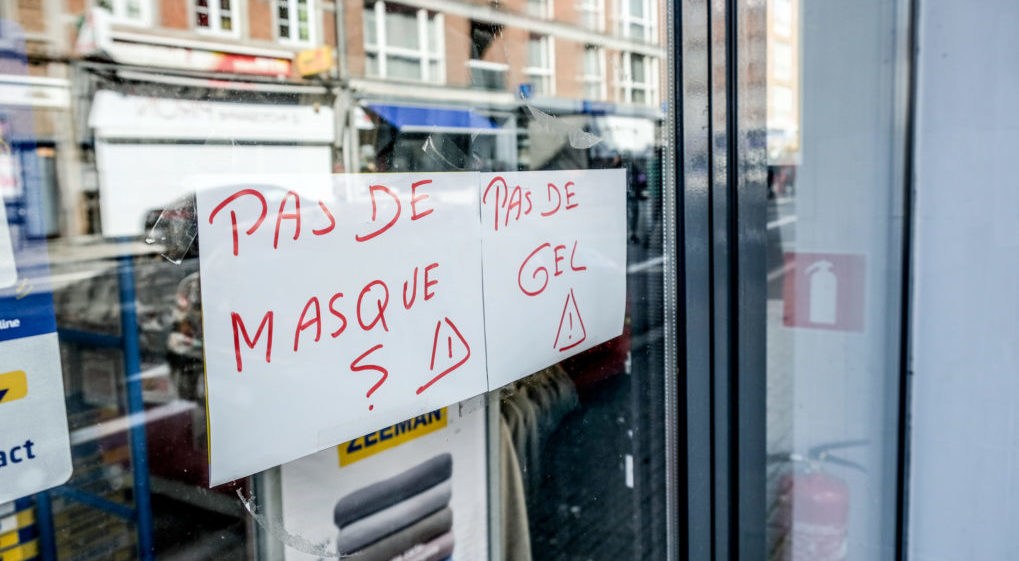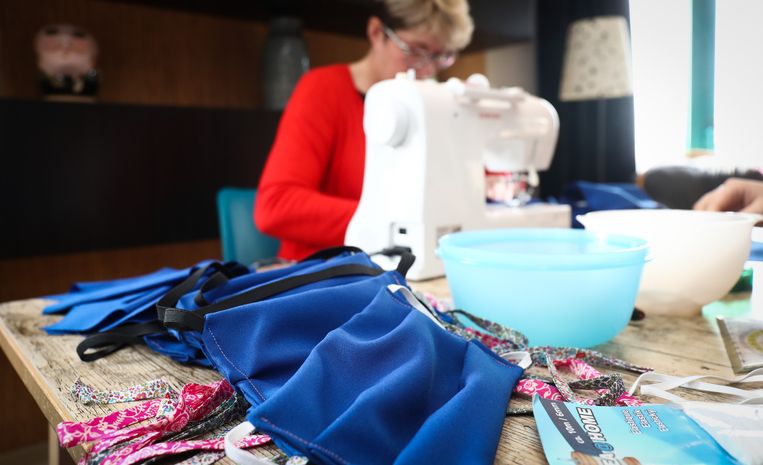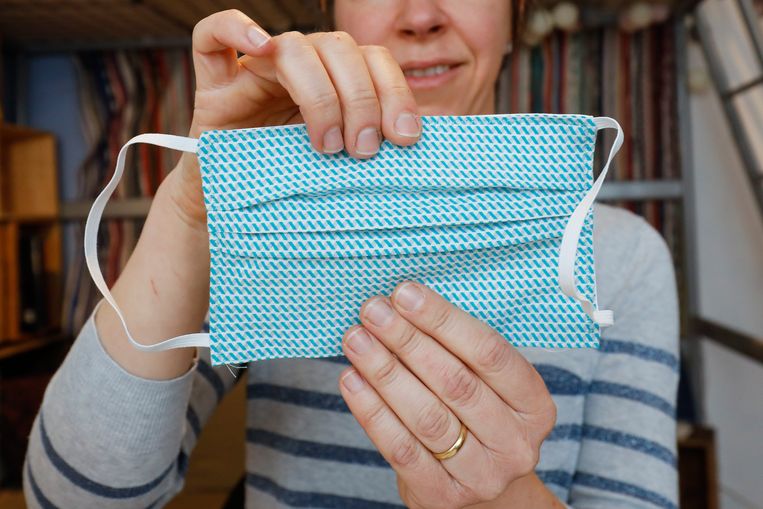Authorities in Brussels are in a race against the clock to ensure residents have access to face masks by the time Belgium enters the first deconfinement stage on 4 May.
From then on, the use of face masks will be obligatory in public transport and recommended in public places and in spaces where social distancing cannot be appropriately implemented.
But with less than a week before that date, there is little clarity and coordination among officials regarding how exactly to get people their masks, despite the announcement of mass purchases at both the regional and federal levels.
Belgium's Justice Minister Koen Geens, appointed to coordinate the effort from the federal level, has already acknowledged it would be "impossible" to get everyone in Belgium a face mask in time for next week.
To make up for the delay, Geens said that citizens could make their own face masks or use a scarf or a bandana to cover their mouths, as public transport companies announced they would "strictly" enforce the regulation.
With the purchase of conventional surgical face masks allowed only by prescription in pharmacies —a rule enacted by federal authorities to safeguard unreplenished national stocks—people's access to face masks will hinge either on their time and skills to sow their own mask or on their local town halls' willingness and capacity to provide them.

A note reading 'no masks, no gel' on a shop window in Namur, Saturday 14 March 2020. Against the backdrop of national and global shortages of medical supplies, Belgium made surgical and respirator face masks sellable only by prescription. © BELGA/BRUNO FAHY
Mayors make a move
In Brussels, a pledge last week by regional authorities to give each resident above the age of 12 (including those in irregular housing situations) at least one reusable fabric face mask came trailing behind local authorities' own initiatives.
"Like other mayors, I thought it was necessary to order, without delay, fabric face masks to be ready for citizens in time for the start of the deconfinement," Etterbeek Mayor Vincent De Wolf told The Brussels Times.
Etterbeek's order for 90,000 masks sucked €380,000 out of the local coffers, with De Wolf saying that there was no indication so far the region would foot or make up for a part of the bill.
Despite the lack of financial backing, De Wolf's decision to go ahead with the purchase will mean that Etterbeek will receive a first batch of 15,000 masks in time for the stage one of the lockdown phase-out, while the purchase at the regional is still in the organisation stages.
"They approved the decision to buy the masks — but the masks aren't here yet," De Wolf said, adding that masks would be sent by post to elderly residents and collection sites would be set up for others.
In the image of Etterbeek, mayors in Jette, Watermael-Boitsfort, Saint-Josse or Ganshoren have all moved to buy or launch face mask manufacturing contracts through local businesses in the past weeks.
In addition, they have also sought to boost production and distribution by appealing to residents to volunteer to make masks.
The municipality of Auderghem has widely communicated on the efforts of ordinary citizens to make thousands of masks and recently set up an online form for residents to order one.
In Jette, officials expect an order for 50,000 to start arriving in a week from Friday, at the latest, the mayor's cabinet said in a phone statement.
The northern municipality has also enlisted the help of volunteers in an attempt to produce an additional 10,000 masks to ensure an even wider availability for their 53,000 inhabitants.
The mayor's cabinet said that when the masks arrived, they would be sent by post to all residents above the age of 65 and that different collection points will be set up for the rest of the population.
Officials in Saint-Josse, the most densely populated municipality, have also been working to provide each registered citizen with a reusable face mask, with a spokesperson saying they aimed to complete the distribution within 15 days.
The municipality's face maks plan was launched on 21 April, as the debate on the efficiency of using face masks in public to curb the spread of the virus was still ongoing at the federal level.
On Tuesday, Saint-Josse spokesperson Murielle Deleu said they still had no information regarding how and when the region would distribute the face masks to the municipalities, adding: "On our side, we are going ahead with the distribution."
In a press statement sent out on Monday, Brussels' Minister-President Rudi Vervoort tasked several regional agencies to coordinate the purchase of fabric face masks, with tenders set to be launched on Tuesday, according to his spokesperson Nancy Ngoma.

Local officials have relied on the time and efforts of ordinary citizens to make up for shortages of face masks, as regional and federal authorities struggle to secure sufficient stocks for the country. © Belga
Do it yourself
Other municipalities, like Ixelles or Auderghem, have not announced mass purchases at this time but have called on regular citizens to make face masks on a voluntary basis.
Auderghem has renewed its appeal for residents to make masks for each other in an effort to ensure that each person has at least one mask by 3 May, saying that they would provide the fabric.
While, at the start of the lockdown, Ixelles launched a call for citizens to make face masks for front-line workers outside the health care sector, the mayor's cabinet could not immediately provide details regarding the current strategy.
The municipality of Forest called on residents to use all kinds of tissues, including kitchen cloths or drapes, to make face masks while Brussels 1000 began asking residents to register for mouth mask distributions.
Calls for residents to volunteer to make masks was also central in federal authorities' strategies to equip people with masks, with the federal public health services (FPS Santé) posting online tutorials for people to make the model they endorse.
Better late than never
At the regional level, authorities are still working out the details of how and when to get the masks to every person in the Brussels-Capital Region.
The regional task force includes several bodies such as health agency Iriscare, Brussels Prevention and Security (tasked with organising the purchase) and start-up accelerator hub.brussels, who will work to identify alternative providers to complement purchases done through the tenders organised by the federal government.
But mayors and their cabinets all said that they still had no clarity regarding when the region would be able to distribute the masks.
Regional spokesperson Nancy Ngoma said in an email statement that the distribution would be done "as quickly as possible," adding that, with the set up for the mass purchase ongoing, it was difficult to provide a timeline.
Echoing several mayors and town hall cabinets, Mayor De Wolf of Etterbeek said that they did not know when the region would have the face masks, but that their arrival at a later date could help renew the masks that residents had been using for some time.
"Fabric face masks have a limited lifespan, depending on the composition, so if the region's masks arrive even a month from now, they would come boost efforts already taken to ensure each person has a functional mask," he said.
Gabriela Galindo
The Brussels Times

